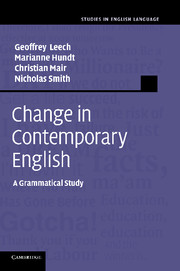Book contents
- Frontmatter
- Contents
- List of figures
- List of tables
- Preface
- Abbreviations and symbolic conventions
- 1 Introduction: ‘grammar blindness’ in the recent history of English?
- 2 Comparative corpus linguistics: the methodological basis of this book
- 3 The subjunctive mood
- 4 The modal auxiliaries
- 5 The so-called semi-modals
- 6 The progressive
- 7 The passive voice
- 8 Take or have a look at a corpus? Expanded predicates in British and American English
- 9 Non-finite clauses
- 10 The noun phrase
- 11 Linguistic and other determinants of change
- Appendix I The composition of the Brown Corpus
- Appendix II The C8 tagset used for part-of-speech tagging of the four corpora
- Appendix III Additional statistical tables and charts
- References
- Index
Preface
Published online by Cambridge University Press: 18 January 2010
- Frontmatter
- Contents
- List of figures
- List of tables
- Preface
- Abbreviations and symbolic conventions
- 1 Introduction: ‘grammar blindness’ in the recent history of English?
- 2 Comparative corpus linguistics: the methodological basis of this book
- 3 The subjunctive mood
- 4 The modal auxiliaries
- 5 The so-called semi-modals
- 6 The progressive
- 7 The passive voice
- 8 Take or have a look at a corpus? Expanded predicates in British and American English
- 9 Non-finite clauses
- 10 The noun phrase
- 11 Linguistic and other determinants of change
- Appendix I The composition of the Brown Corpus
- Appendix II The C8 tagset used for part-of-speech tagging of the four corpora
- Appendix III Additional statistical tables and charts
- References
- Index
Summary
This book aims to give an account of how the English language has been changing recently, focusing especially on (a) the late twentieth century, (b) the written standard language, (c) American and British English, (d) grammatical rather than lexical change, and using the empirical evidence of computer corpora.
Corpus linguistics is now a mainstream paradigm in the study of languages, and the study of English in particular has advanced immeasurably through the availability of increasingly rich and varied corpus resources. This applies to both synchronic and diachronic research. However, this book presents, we argue, a new kind of corpus-based historical research, with a narrower, more intense focus than most, revealing through its rather rigorous methodology how the language (more especially the written language) has been developing over a precisely defined period of time in the recent past.
The period on which the book concentrates is the thirty years between the early 1960s and the early 1990s, and the four corpora that it studies in most detail are those which go increasingly by the name of the ‘Brown family’: the Brown corpus (American English, 1961); the Lancaster–Oslo/Bergen corpus (British English, 1961); the Freiburg–Brown corpus (American English, 1992); and the Freiburg–Lancaster–Oslo/Bergen corpus (British English, 1991).
These corpora, described in more detail in Chapter 2 (section 2.2) and in Appendix II, are reasonably well known, and have been studied as a group, not only by ourselves, but by others, since the completion of this corpus quartet in the mid-1990s.
- Type
- Chapter
- Information
- Change in Contemporary EnglishA Grammatical Study, pp. xix - xxivPublisher: Cambridge University PressPrint publication year: 2009

